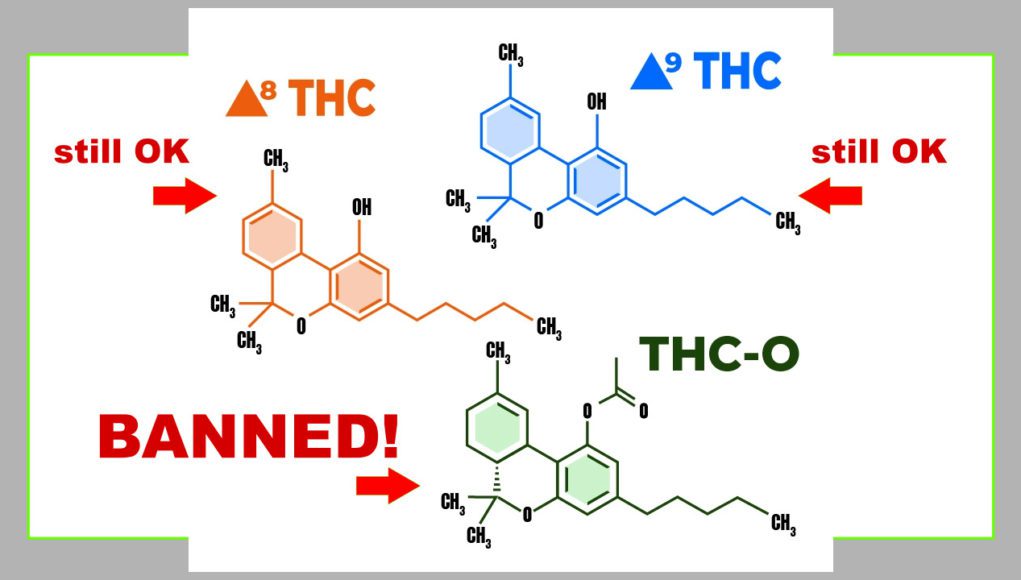I read the news today… and ouch! THCO (THC acetate ester) has been reclassified by the US DEA as a Schedule 1 substance, and the DEA points out that THCO does not occur naturally in the cannabis / hemp plant – hence not Farm-Bill-legal. On top of this and on deeper digging, we uncover research which suggests that all cannabis acetates – or possibly any acetate – produces harmful chemicals when vaped.
Is THCO Harmful?
According to the Department of Chemistry, Portland State University, Portland, OR, vaporized THCO (both delta 8 THCO and delta 9 THCO) produces ketene, a known harmful substance described as a “poison gas.” THCO has “a similar substructure to vitamin E acetate” and vitamin E acetate “has been shown to form the poison gas ketene during vaping.”
In addition, the same study was conducted on two other acetate forms of alternative cannabinoids, CBN acetate and CBD acetate. All of the acetate cannabinoids were shown to produce ketene.
The mazmat on ketene:
> “Inhaling Ketene can irritate the lungs causing coughing and/or shortness of breath. Higher exposures may cause a build-up of fluid in the lungs (pulmonary edema), a medical emergency, with severe shortness of breath.”
This looks to be similar to the original EVALI lung damage epidemic among cannabis cartridge vape users back in 2019. That epidemic was caused by vitamin E acetate, an additive originally used to make vape oil thicker. Thus far, we do not know if we are going to see a repeat of that scenario with THCO – hopefully not! – but vape-related lung injury cases continue to this day and it may turn out that acetates in general are the culprit or a culprit.
I Have Vaped THCO; Am I Gonna Die?
You are probably fine! As long as you are not vaping an acetate currently. Ketene is an irritant to the lungs and may cause a medical emergency on the spot. The ketene hazmat states that no tests have been conducted on the long-term effects of ketene exposure, specifically “Ketene has not been tested for its ability to cause cancer in animals” and “Ketene has not been tested for its ability to affect reproduction.”
HOWEVER: If you have vaped THCO or another acetate cannabis product and are experiencing symptoms, consult a doctor right away. Don’t put your life in our hands; we’re just a bunch of blogging stoners.
Since THCO and other cannabinoid acetates have only been on the market for a short time (about a year-ish), and not that widely popular to begin with, it might be possible that no one has had long-term enough exposure to make a difference.
Does the Danger of Vaping THCO Apply To Other Forms of Consumption?
As far as we know, no. Once again, vaporization of cannabinoids is itself a relatively new practice, and different things happen chemically when we apply hundreds of degrees of temperature to it. So as far as we know now, THCO might still be safe in edible products.
What About THCO is Different From Other Alternate Cannabinoids?
THCO is 100% synthesized; NO trace of THCO is found in the natural cannabis plant. Thus, in the first place, it is not covered by the farm bill. THCO is a synthesized acetate. While it is true that other cannabinoids can be synthesized as well, the important distinction is that all of CBD, HHC, delta 8 & 9 THC, CBN, etc. are all found in the cannabis plant naturally, albeit in smaller quantities.
Rod Kight on Cannabis Business Law breaks this down beautifully – and what a rare treat to find a legal professional so well-versed in cannabis chemistry! Kight is the person who reached out to the DEA to inquire about its legal standing in the first place.
Are the Other Cannabinoids Still OK?
As long as they naturally occur in the hemp plant. Hemp has been cultivated and enjoyed for practically all of human history, and so far we have zero fatalities attributed to any natural cannabinoid. However, the possible synthetic chemicals that are cannabinoid mimics are nearly endless, and quite a few of them are known to be hazardous.
How Do I Be Sure That I Am Vaping Safely?
First, always get your product from a licensed cannabis dispensary, since street plugs filling cartridges might use anything and you have no guarantee of safety.
Second, since all acetates in the OR study were found to produce ketene, we advise THROWING OUT all acetate cannabinoid products immediately. Furthermore, we would advise those in the industry to be stringent in screening cannabinoid acetates out of the vape market entirely. There are dozens of harmless natural cannabinoids to enjoy – why take a chance?
Third, give a glance at the lab test sheets for all cannabis products going forward, make sure there’s no acetates in there. I have no idea how possible it is for THCO or other acetates to find their way into a vape cartridge accidentally, but that’s one of the reasons why we test these things.
What Do Cannabis YouTubers Have To Say About THCO?
Cewpins:
Strain Show:
Conclusions
While the capacity for acetates to produce ketene when vaped has been known for a while, the big news that has changed is that the US DEA has classified them specifically as Schedule 1 controlled substances; not necessarily because of the health risks, but simply because synthesized, non-natural cannabinoids are not covered by the Farm Bill.
Readers, share your thoughts on this development here in the comments or in our forum. But please, take your medical questions to a licensed physician.













